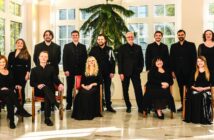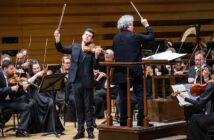
This page is also available in / Cette page est également disponible en:
![]() Francais (French)
Francais (French)
Although mostly known for his inspired programming as founding Music Director and Principal Conductor of Toronto’s Kindred Spirits Orchestra, conductor Kristian Alexander’s talents run much deeper. Builder, pedagogue, innovator, and polymath are just a few words to describe the man with a multinational career, and an empire of organizations he single-handedly built over the years. He’s also multilingual, fluent in English, French, Bulgarian and Russian, with a good working knowledge of German and Italian to boot.
Born in Bulgaria in 1969 to an engineer father and architect mother, Alexander grew up surrounded by music. His parents frequently hosted dinners for friends that turned into musical soirées. When he was three years old, his mother started taking him to see ballet or opera every Sunday. “We had seats in the first row of the orchestra level, just behind and to the left of the conductor. I was mesmerized by the colourful sound coming from the pit and thought of the conductor as a magician who was using his hands to make music come alive,” he recalls.
At the tender age of five, Alexander announced he wanted to be a conductor, so his parents put him in piano lessons. Soon after, his teacher discovered he had absolute pitch, could memorize music quickly and sight-read with ease, and sent him for lessons in solfège and harmony. At age 14, while attending a live broadcast of a national competition for new choral works, he was asked on short notice to step in for an injured pianist to accompany one of the choirs that then went on to win the grand prize. This chance encounter led to a spot in advanced piano studies at the National Music Academy in Sofia.
Despite his pianistic accomplishments, Alexander’s true calling was conducting, which became his main field of study. From the very beginning, his professors remarked on his natural ability to balance instrumental tonalities and colours in a special way. As Alexander puts it, “When I conduct, the feeling of completeness and losing myself in expressing music through gestures, body movement, facial expression and an extraordinary connection with the musical instruments, have a profound impact on me on a deeply personal level.” He graduated from the National Music Academy with two master’s degrees—one in conducting, the other in theory and composition.
But for Alexander, it was never just about conducting. He was just as interested in building organizations from the ground up. This led to his founding of Sofia’s Mozarteum Symphony Orchestra while still in his early 20s, presenting three concert seasons with them, as well as frequent recordings for broadcast on national TV and radio. One of his recordings caught the attention of German musicologist Rudolph Angermüller who was impressed with his interpretation of early Mozart works. Angermüller invited him to the Mozarteum in Salzburg, where the young conductor viewed original Mozart manuscripts in the archives of the Stiftung Mozarteum. Alexander also received an award from the International Mozarteum Foundation comprising all 20 volumes of the Neue Mozart Ausgabe (NMA) which remains a proud centrepiece of his personal library today.
Further studies took him to Germany, where he worked on Bach and Mozart with Helmuth Rilling at Stuttgart’s Internationale Bachakademie. While there, he conducted the Gächinger Kantorei and the Bach-Collegium Stuttgart in concerts at the Stuttgart Liederhalle. As it happened, Canada’s ambassador to Austria was in attendance at his graduating concert, an encounter that prompted Alexander to reconsider his career options: remain in Europe and work towards becoming an orchestral conductor in Vienna or take an assistant conductor position across the pond at Opéra de Montréal. He was at a major crossroads and sought advice from Rilling. By that time, Alexander had already conducted Don Giovanni, Le nozze di Figaro, and Carmen, so the idea of working at a major opera company eventually won over.
And so, in 1996, he began his journey in Canada. The conductor made his mark at Opéra de Montréal, earning high accolades as assistant conductor for their production of Jenůfa. A lifelong learner, he also found time to earn a master of arts in theology from Université de Montréal and a postgraduate diploma in arts management from HEC.
One of Alexander’s mentors was Swiss conductor Gustav Meier with whom he studied the symphonies of Beethoven, Brahms, Schumann and Mendelssohn. With Meier he also focused on body language, developing a vocabulary of gestures that reflected musical imagery, and on mastering the psychology of conducting.
He worked on French Impressionist and 20th-century Russian repertoire with Charles Dutoit in Philadephia from 2005-07, another major influence on his musical journey. “[Dutoit] has an unparalleled ability to balance sound and to create seamlessly flowing transitions,” says Alexander. He notes that the years he studied with Dutoit were instrumental in creating a framework that enabled him to balance important elements: perfectionism and the need for uncompromising quality, leadership, and a healthy lifestyle.
Still, Alexander never put the idea of creating an orchestra to rest. “I enjoy building complex organizations and teams from the ground up. It excites me to see them grow and mature to a level that allows them to work well with minimal control,” he notes. A 2008 meeting with fellow conductor Benjamin Zander, founder of the Boston Philharmonic Orchestra, further confirmed what Alexander knew all along: “We came to a conclusion that what I had in mind about conducting can happen only if I build my own orchestra.”
By the time he was in his 30s, Alexander was ready to realize his dream. He moved to Toronto to expand his career in English-speaking Canada. There, he commissioned comprehensive marketing research in the Greater Toronto Area to identify market niches and competitive advantages that a new symphony orchestra could potentially fill in addition to the region’s 18 existing orchestras. The result came in 2009 when Alexander founded the Kindred Spirits Orchestra (KSO). It is KSO’s programming that distinguishes it from the competition. While mainstream, classical repertoire was a feature of its first few seasons, Alexander’s vision for the new orchestra was to specialize in rarely performed masterworks by 20th-century composers such as Shostakovich’s 6th and 14th Symphonies, Prokofiev’s Piano Concerto for the Left Hand, Dukas’s La Péri, Richard Strauss’s Second Symphony, and works by Hindemith, Schönberg, Schnittke, and Nielsen.
Alexander deliberately chooses works that challenge both his musicians and audiences. “Through meaningful rehearsals and fulfilling concerts, the musicians grow together, not only in overcoming technical difficulties, but also in their overall musicianship,” he says. In turn, KSO’s audiences also broaden their musical horizon and become more sophisticated in their musical tastes. The maestro likes to keep things fresh by introducing new works every year. In KSO’s 14 seasons, only a small handful of pieces have been repeated. The orchestra also regularly commissions and premieres new works by contemporary composers like James Campbell, Chan Wing-Wah and Werner Chan.
Alexander strongly believes in nurturing young talent. Rather than segregate its young musicians into a separate youth orchestra as do many other symphony orchestras, KSO gives them—many of whom are still in high school—the unique opportunity to audition and earn a spot in the orchestra. Making up one quarter of the KSO, these young musicians play alongside, and receive mentorship from, the orchestra’s professional core members. In 1996, Alexander founded the International Music Academy (IMA), a private music school in the York region that today has over 400 students and employs about 20 specialists teaching orchestral instruments, piano, voice, and theory. The Markham Contemporary Music Festival, which he founded in 2011, promotes performances by local artists of world music written by 20th and 21st-century Canadian, Indigenous, American, Asian, and European composers.
In 2019, he founded the International Music Festival and Competition, with a mission to provide aspiring musicians a forum to perform, conduct and write music, while receiving professional guidance from leading experts from the University of Toronto, York University, Royal Conservatory of Music, Glenn Gould Professional School, Toronto Symphony Orchestra, Canadian Opera Company and the National Ballet of Canada. It is also Alexander’s philosophy to support and provide musical education opportunities to the less fortunate. Through the IMA, over a 1,000 bursaries and scholarships have been given to youth from low-income families, and those with mental or physical disabilities, to learn a musical instrument. In addition, KSO offers many community outreach and educational programs for children, seniors, and people with disabilities.
Alexander still finds time to guest conduct in Hong Kong, Cairo and all over Europe and Canada. He has been appointed advisor and moderator for many conductor forums, including representing Canada on the Board of Directors of the International Conductors Guild for six years, and chairing the first International Conference for Conductors in Toronto. When not immersed in the musical world, he indulges in alpine skiing, astronomy and piloting small planes.
The recent global pandemic has forced music organizations around the world to overcome restrictions and innovate new ways to connect with their audiences, and KSO was no exception. Since October 2020, Alexander has led the KSO in 11 full-scale live-stream concerts. Despite the many challenges with physical distancing, playing behind Plexiglass shields, and navigating uncertainties, Alexander feels the musicians found solace in making music together. As another testament to his quest for constant innovation, KSO became the first orchestra in Canada to migrate to a fully digital library platform, with iPad Pro tablets permanently replacing printed music scores.
Twenty years ago, Alexander set a lofty goal to conduct a list of about 500 orchestral works and has since presented 417 of them. He plans to complete this life project within the next few years. Another ambition is to expand his guest-conducting into the American, Australian and South American markets, while maintaining his current relationships with Canada, Europe and China. Later this year, he has engagements to conduct Verdi’s Requiem with the Hong Kong Oratorio Society, Mussorgsky’s Pictures at an Exhibition with the Sudety Philharmonic in Poland, and Shostakovich’s 10th Symphony with the Sofia Philharmonic in his native Bulgaria. He is also set to debut with the Changsha Symphony in China. His strategic plan for the next few years includes securing touring and recording engagements for the KSO.
The quintessential maestro sums up his career this way: “Conducting is a lifestyle; it starts the moment I wake up and ends when I fall asleep.”
This page is also available in / Cette page est également disponible en:
![]() Francais (French)
Francais (French)















